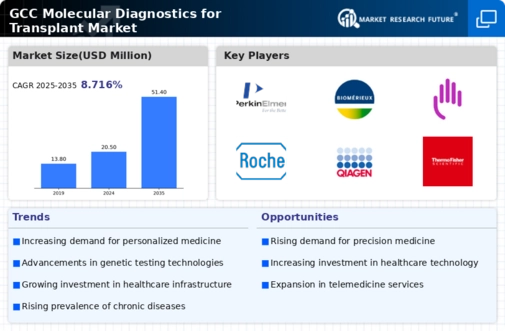Growing Focus on Personalized Medicine
The GCC molecular diagnostics transplant market is increasingly aligning with the global trend towards personalized medicine. This approach tailors medical treatment to individual characteristics, particularly genetic profiles, which is essential in transplant scenarios. The demand for personalized diagnostics is rising, as healthcare providers recognize the importance of matching donors and recipients based on genetic compatibility. Countries like Qatar and Kuwait are investing in genomic research to enhance their transplant programs. The integration of molecular diagnostics into personalized medicine strategies is likely to improve patient outcomes and reduce the risk of transplant rejection. This growing focus on individualized care is expected to drive the market forward, as stakeholders seek to implement more precise and effective diagnostic solutions.
Increasing Incidence of Chronic Diseases
The GCC molecular diagnostics transplant market is witnessing growth due to the rising incidence of chronic diseases that often necessitate organ transplants. Conditions such as diabetes, hypertension, and liver disease are becoming more prevalent in the region, leading to a higher demand for transplant procedures. According to the World Health Organization, the prevalence of diabetes in the GCC countries is among the highest globally, which correlates with an increased need for kidney transplants. This trend is prompting healthcare systems to invest in advanced molecular diagnostics to ensure better matching of donors and recipients. As the burden of chronic diseases continues to rise, the market for molecular diagnostics in transplant settings is likely to expand significantly.
Regulatory Support and Policy Development
The regulatory landscape in the GCC region is evolving to support the growth of the molecular diagnostics transplant market. Governments are implementing policies that facilitate the approval and adoption of innovative diagnostic technologies. For example, the Saudi Food and Drug Authority (SFDA) has established guidelines to expedite the registration of molecular diagnostic devices. This regulatory support is crucial for fostering a conducive environment for market players. Additionally, initiatives aimed at enhancing healthcare infrastructure, such as the UAE's Health Strategy 2021, are likely to bolster the adoption of molecular diagnostics in transplant procedures. As regulatory frameworks become more favorable, the market is expected to witness increased investment and participation from both local and international companies.
Rising Awareness and Education on Organ Donation
The GCC molecular diagnostics transplant market is benefiting from increased awareness and education surrounding organ donation. Governments and non-profit organizations are actively promoting the importance of organ donation through campaigns and educational programs. This heightened awareness is leading to a gradual increase in organ donation rates, which is essential for the success of transplant programs. For instance, initiatives in the UAE have resulted in a notable rise in registered organ donors. As more individuals become aware of the benefits of organ donation, the demand for molecular diagnostics to ensure compatibility and improve transplant outcomes is expected to grow. This cultural shift towards supporting organ donation is likely to positively impact the market, fostering a more robust transplant ecosystem.
Technological Advancements in Molecular Diagnostics
The GCC molecular diagnostics transplant market is experiencing rapid technological advancements that enhance diagnostic accuracy and efficiency. Innovations such as next-generation sequencing (NGS) and polymerase chain reaction (PCR) techniques are becoming increasingly prevalent. These technologies allow for the identification of genetic markers associated with transplant compatibility, thereby improving patient outcomes. For instance, the integration of artificial intelligence in diagnostic processes is streamlining data analysis, leading to quicker decision-making. The GCC region has seen a rise in research and development investments, with countries like Saudi Arabia and the UAE prioritizing healthcare technology. This focus on advanced diagnostics is likely to drive growth in the market, as healthcare providers seek to adopt cutting-edge solutions to improve transplant success rates.


















